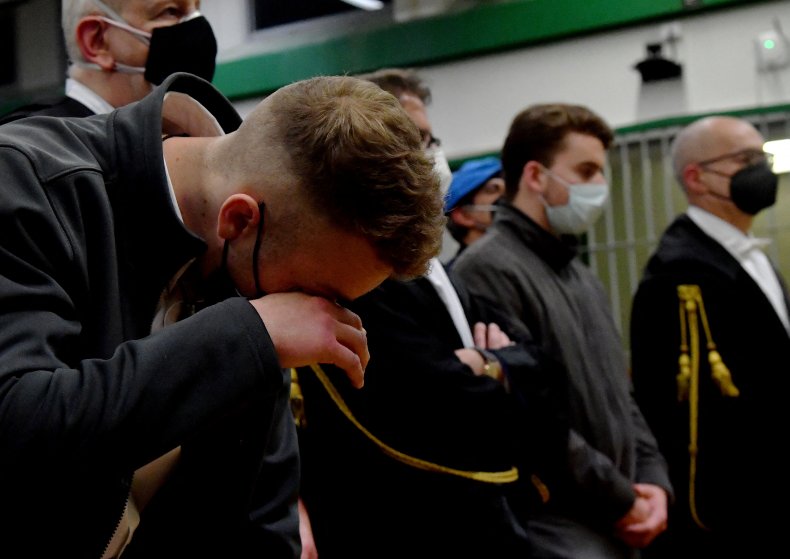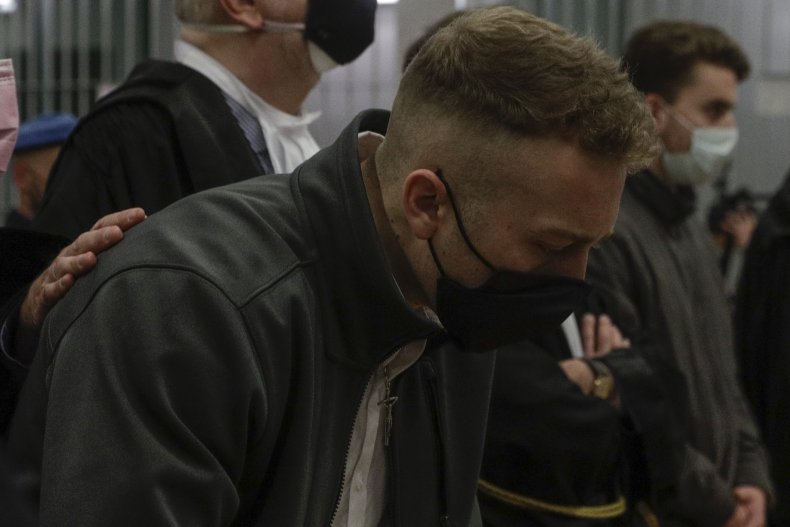Life Sentences for 2 Americans in Italian Cop's Murder 'Befitting a Mafia Boss,' Lawyer Says
After two young American friends from California were sentenced to life in prison Wednesday in Italy for the murder of an Italian police officer in 2019, U.S. lawyer Craig Peters said it was a punishment "befitting a mafia boss" and "a mockery of justice," the Associated Press reported.
Finnegan Lee Elder, 21, and Gabriel Natale-Hjorth, 20, received Italy's harshest sentence in a trial that lasted more than 14 months after Elder stabbed Carabinieri Vice Brigadier Mario Cerciello Rega to death in Rome while Natale-Hjorth later hid the knife in their hotel room.
"They gave him and they gave Gabe a sentence that is befitting a Mafia boss who wantonly kills innocent people,'' Peters, who is a spokesman for the Elder family, told AP on Thursday. "How could these two boys possibly be in that same league? So from a reasoned standpoint, the verdict didn't make any sense to hold them guilty on every single charge."
Both were found guilty of five identical counts of murder, attempted extortion, resisting a public official, injuring Cerciello Rega's partner and unjustly carrying an attack-style knife.
Cerciello Rega and his partner, Andrea Varriale, were dressed in casual clothing in July 2019 when responding to an alleged extortion attempt after Elder and Natale-Hjorth lost money in a failed drug deal to obtain cocaine and stole a backpack with a cellphone belonging to the deal's negotiator.
Lawyers maintain that Elder and Natale-Hjorth acted in self-defense since they thought the Italian officers were drug dealers or mafia members because they were not in uniform.
Life imprisonment in Italy often is a sentence given to mobsters who assassinate state officials, according to AP.
"From a compassion standpoint, it made no sense to put them on the same level as cold-blooded killers...even the prosecutor acknowledged there was no premeditation here," Peters said.
For more reporting from the Associated Press, see below.

Months after the July 26, 2019, slaying of Cerciello Rega in Rome, prosecutors asked for indictments for the two then-teen friends. They described them as being in cahoots from start to finish, even though only one of them wielded the knife in what their lawyers steadfastly contended was in self-defense.
When trial ended Wednesday night, the jury convicted both on all charges and handed them life sentences.
Elder said that he stabbed Cerciello Rega because he feared he was being strangled as the two scuffled on a Rome street. Natale-Hjorth testified that at his friend's request, he hid the knife in their hotel room after the stabbing.
Natale-Hjorth testified that he didn't know Elder had a knife on him.
A go-between told police he had been contacted by Natale-Hjorth, who told the man he'd give back the bag and the phone if they got their money back.
Italy's justice system is supposed to stress rehabilitation. Many sentenced to life imprisonment are often released after serving 20 years. There is an ongoing debate, however, over whether convicted mobsters, serving time for crimes including multiple murders and bombings that killed magistrates and anti-Mafia investigators, should have to stay in prison until death.
Italy's complicated, drawn-out justice system foresees two levels of appeals.
The Americans' defense teams are likely to highlight apparent failure of the Italian police to follow procedures. Neither Cerciello Rega nor his fellow plainclothes partner, Varriale, brought their service pistols on their assignment.
An official said it was unknown why Cerciello Rega left his pistol in his locker. Varriale, who scuffled with Natale-Hjorth, offered various versions, eventually testifying that he, too, didn't bring his weapon.
Varriale claimed the two officers showed their police badges, while the Americans said they didn't and that they thought the Italians were drug dealers or mafiosi.
Not infrequently, Italian appeals courts either throw out earlier convictions or significantly reduce the sentences.
One noted example of that involved a young American woman, Amanda Knox, and her former Italian boyfriend, Raffaele Sollecito. In that case, Italy's top criminal Cassation court scathingly faulted prosecutors for presenting a flawed and hastily constructed case. It threw out their lower-court convictions for the 2007 murder of her British roommate in Italy. Had they lost their final appeal, Knox would have faced 28½ years in an Italian prison; the Italian, 25 years.
At the Italian appeals level, Peters said, "hopefully we will have more sophisticated, more experienced, more reasonable and rational judges who will actually do the hard work of trying to make sense of all this and then fairly apportion justice."


